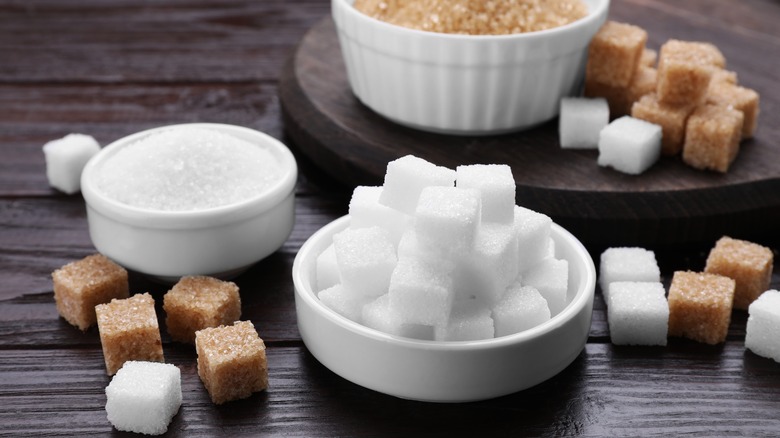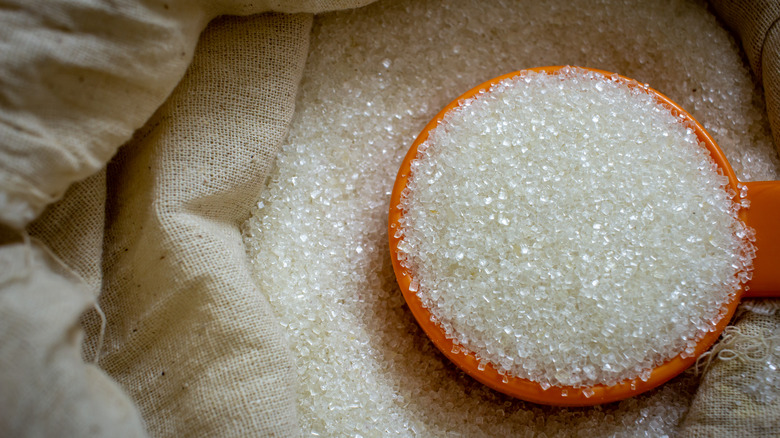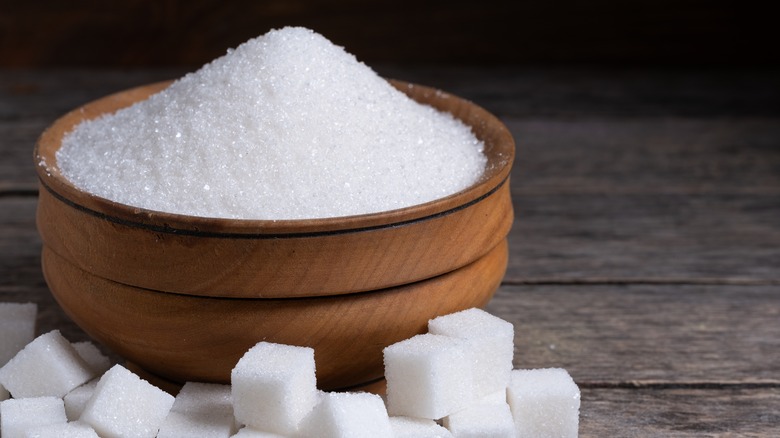What's The Actual Difference Between Cane Sugar And Granulated Sugar?
Anyone who has been comforted by a sweet treat at the end of a tiring day can attest to the powers of sugar. Consuming sugar in moderation certainly gives you a quick boost of energy, and there are many ways to enjoy it. In the world of cooking and baking, there are dozens of different types of sugar (or ingredients that are high in natural sugars, like honey) to help you add the perfect amount of sweetness to any dish; baked goods, drinks, steak rubs, and even fish can be enhanced with a bit of sugar. It also comes in a dizzying array of names, ranging from pearl to turbinado to muscovado. Two of the most popular options you'll see on grocery store shelves are cane and granulated sugar.
Cane sugar is typically less processed, which gives it a slightly caramelized flavor. Granulated sugar, on the other hand, is highly refined and has a more neutral sweetness to it. Both sugars deliver a sweet punch and can often be used interchangeably in recipes, but they do have a few subtle differences that make each one better suited for certain applications.
What is cane sugar?
Cane sugar is derived exclusively from sugarcane, a tropical plant cultivated in warm climates throughout the world. After being harvested, sugarcane is pressed, and the resulting juice is evaporated, leaving behind sugar crystals and molasses. The more sugar is processed, the more separated the sugar crystals and molasses become. Cane sugar typically undergoes less refining than granulated sugar, which means it retains a bit of molasses flavor. This adds warm, caramel-like undertones to recipes, making it a top choice for spiced baked goods and desserts that can handle more complexity. It does, however, also mean that substituting cane sugar for granulated sugar will add new flavor — don't swap them unless you're prepared to account for this.
Compared to granulated sugar, cane sugar is coarser and has a richer, more golden color. Due to the larger crystals, cane sugar takes longer to dissolve in something like a cold beverage, so it might not be the right choice to sweeten your iced coffee. Cane sugar is popular among those looking for a slightly more "natural" product, though it's important to note that both cane and granulated sugar are refined to some degree. In cane sugar healthier than granulated white sugar? Not really: In terms of nutrition, there is very little difference between cane and granulated sugar. Depending on whether it's branded as organic, cane sugar can cost around $1.50 per pound, making it more expensive than granulated sugar. It may be slightly harder to get your hands on, but cane sugar's mild molasses flavor might be worth the extra cost for those looking to give their cookies some flavorful depth.
What is granulated sugar?
Granulated sugar is the highly refined, white table sugar most people use on the day-to-day. It can be made from either sugarcane or sugar beets, depending on the brand, and goes through a more intensive refining process than cane sugar. This process removes the majority of its impurities, resulting in a super fine texture and a flavor that is pure sweetness. Granulated sugar's clean taste and neutral profile make it suitable for virtually any recipe, from baked goods to beverages. This is also the best choice for homemade powdered sugar.
Because of its fine texture, granulated sugar dissolves easily even in cold liquids, which makes it a go-to for drinks, sauces, and recipes where you want a smooth, even sweetness. Its widespread availability and relatively low price (around $0.80 per pound) make granulated sugar the standard option for most cooking and baking needs, particularly in recipes where a purely sweet, unflavored profile is best. It's also simple to caramelize granulated sugar to turn it into a sweet, crunchy treat.
If you're a casual cook, there's no need to be precious about what type of sugar you use; just go off of your own tastes and budget. But, if you're trying to refine your cooking or baking process, don't be afraid to play around with the bold taste of cane sugar or the versatile convenience of granulated sugar.


